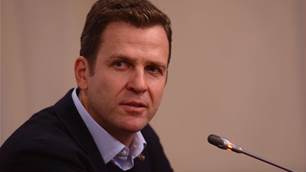ONE of the men who blocked the use of technology in football today insisted video replays would risk endangering the "brilliant" game - despite the furore over Frank Lampard's disallowed goal.
Jonathan Ford, president of the Football Association of Wales, voted with FIFA against any experiments with technology when the matter was raised at a meeting of the game's rulemakers in March.
Ford stands by the FAW's position and said it would be a potentially dangerous move to change the game so fundamentally by introducing goal-line technology or video replays.
Ford told Press Association Sport: "We have a beautiful game played by millions and millions of people which is the most popular sport in the world.
"Why are we wanting to change something so brilliant just on the back of one disallowed goal by England against Germany?
"Let's be honest. If it had been Germany that had been denied that goal we would not be having this debate in this country.
"If we introduce goal-line technology it will lead to replays and then to every decision being challenged down to a throw-in and that would change the game as we know it."
Experiments in technology were blocked at a meeting of the International FA Board in March, where the Irish FA and FAW voted with FIFA against the FA and Scottish FA.
Irish FA president Raymond Kennedy admits he was astonished that the match officials had not awarded Lampard's goal, but claims Michel Platini's proposal of an extra assistant referee behind each goal is the way forward.
Kennedy told Press Association Sport: "Goal-line technology would not have spotted Thierry Henry's handball against the Republic of Ireland or Carlos Tevez being blatantly offside against Mexico and I'm not in favour of video replays.
"I support Platini's idea. Had there been an extra official behind the goal-line he would surely have picked up that the Lampard shot had crossed the line.
"He would also be watching for things going on in the penalty area. I think this will solve most of the problems and still keep the game human."
Even Prime Minister David Cameron has added his voice to calls for a review of technology in football, but FIFA today refused to defend their position.
Asked if FIFA were embarrassed by becoming a laughing stock, FIFA communications director Nicolas Maingot insisted he was "not competent" to answer questions on refereeing, nor was he the person to defend the world governing body's position on technology.
Maingot said: "The International FA Board, which FIFA is a member of along with the four British associations, dealt with this topic in March. A clear decision on the use of technology was taken at the time.
"I don't think football is very much different from other sports and not all sports have recourse to technology."
The international players' union FIFPro have added their voice to calls for technology.
Tijs Tummers, secretary of FIFPro's technical committee, said: "We can do it, the football world wants it and yet it is still being thwarted, that is unacceptable.
"The error during the Germany-England match would have been the easiest to avoid. There is not a single convincing argument against the use of goal-line technology.
"With offside incidents it is slightly more complicated, but the Argentinian goal which was allowed to stand shows the failure of the system even better.
"Technology does not undermine the authority of referees, it only helps them."
FIFA have admitted that replays of Tevez's controversial goal should not have been shown on the giant screens inside Soccer City stadium, which prompted angry Mexico players to surround Italian referee Roberto Rosetti.
Maingot said: "There was a controversial action shown during the game on the giant screens. This should not happen.
"The giant screens are part of the infotainment but should not show controversial actions.
"It's handled by a team of colleagues from the organising committee and it has worked very well in most cases. Last night was a clear mistake.
"We will work on this and tighten up on this for the games to be played."
Asked about the use of technology, FIFA president Sepp Blatter told Sky Sports News: "Tomorrow I will have a press conference.
"We are in a World Cup, we have a principle, we cannot change the principle in the World Cup."
That could be interpreted as a hint that Blatter will be open to changes after the tournament has finished, but that would be of little consolation to those countries affected by poor decisions already.
Related Articles

Spain versus Italy to go ahead

Farina: We got schooled by Roar













